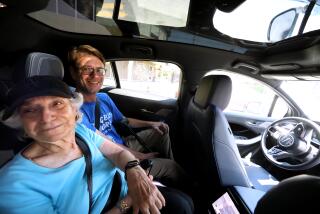Mobility Loss for the Elderly
- Share via
Your article on the elderly giving up their car keys (Jan. 6) points out a concern to all of us as we age. Fortunately, engineers throughout the region are starting to design roadways to be friendlier to elderly pedestrians. Recently the Federal Highway Administration revised its recommended traffic signal timing to accommodate older pedestrians. I encourage all pedestrians who encounter a walk signal that switches too quickly to contact their city engineer.
A few cities have rebuilt their downtowns to be friendlier to pedestrians, with superb results. An elderly person could easily live near the Claremont and Montrose downtowns without a car.
One minor correction: While elderly drivers may have a risk of collision per mile of driving approaching that of a teenager, since they drive fewer miles, their number of collisions is far less.
PETER JACOBSEN PE
Pasadena
* While it is sad that old people lose their independence when they can no longer drive, do you not realize that it is driving itself that has stolen their freedom? Cars give you mobility at the price of independence, for you then become dependent on the car. If the people in your article had driven less during their lives, and walked or bicycled for a least their shorter trips, chances are that most of them would still be independent--truly independent--into extreme old age, and possibly still able to drive when they really needed to.
A simple prescription: If it’s less than a mile, walk, if it’s less than five, ride a bicycle. Your mind will be clearer, your body stronger, your life and community the richer for it. You will be able to face old age as a challenge and not as a threat.
RICHARD RISEMBERG
Los Angeles
* Your article is both poignant and timely. Every day I interview people who must cope with lifestyle changes brought about by vision loss. If vision loss occurs in the late teens or early 20s, traveling to college classes, finding employment, getting to work and just participating in routine social events can be very challenging. If vision loss happens to working-age adults, keeping a job, career advancement and financial security can certainly be threatened. In my middle 40s, I lost a job because I could no longer drive. My vision was affected because of diabetic retinopathy. But I’m lucky. I have a wife who is a willing driver and I live close to dependable bus service.
Here at the center we try to help people remain as independent as possible. We provide training so they can travel safely by themselves. We also teach independent living skills so they can perform everyday chores like cooking. We offer support groups and psychological counseling.
DON KIGER
Social Services Coordinator
Center for the Partially Sighted
Santa Monica






